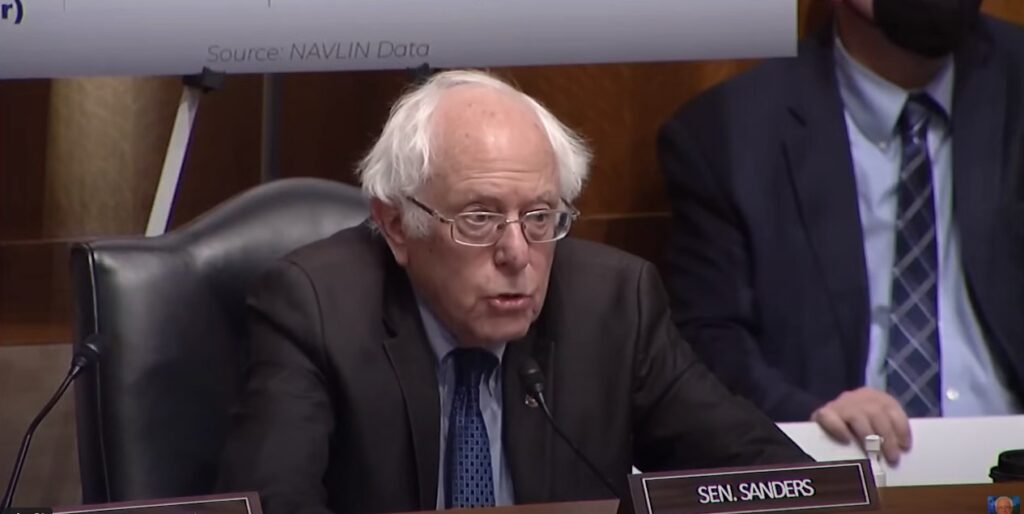After grilling the CEOs of Merck, J&J and Bristol Myers Squibb (BMS) about high drug prices earlier this year, Bernie Sanders is now going after Novo Nordisk and the high prices of its blockbuster GLP-1 drugs Ozempic and Wegovy.
Sanders announced this week that he was launching an investigation into the “outrageously high” prices of the semaglutide products. He sent a letter to Novo Nordisk CEO Lars Fruergaard Jørgensen informing him of the investigation, which is being conducted by the Senate Committee on Health, Education, Labor and Pensions (HELP Committee) that Sanders chairs.
In the letter, Sanders criticized Novo for charging “unjustifiably high prices” for the GLP-1 agonists.
Sanders provided a cost comparison of the prices of Ozempic and Wegovy, approved for the treatment of type 2 diabetes and obesity, respectively, in the US versus other countries.
In the US, Ozempic is priced at $969 a month while it sells for $155 in Canada and $59 in Germany. Wegovy costs slightly more than Ozempic at $1,349 a month in the US. In comparison, the same exact product can be purchased for just $140 in Germany and $92 in the UK, Sanders pointed out.
According to an estimate from researchers at Yale University, Sanders noted that both of the drugs can be “profitably manufactured for less than $5 a month.”
Wegovy nabbed a second US Food and Drug Administration (FDA) approval in March for reducing the risk of cardiovascular death, heart attack and stroke in adult patients with cardiovascular disease who have obesity or are overweight.
Related: Pharma CEOs Grilled by Senate Committee About High Prescription Drug Prices
“In my view, the American people should not have to pay up to $1,349 a month for prescription drugs that cost less than $5 to manufacture and can be purchased at a fraction of this price in other developed countries,” said Sanders.
He went on to say that “the result of these astronomically high prices is that Ozempic and Wegovy are out of reach for millions of Americans who need them.”
A Luxury Drug Maker
Sanders accused Novo of turning into a luxury drug maker of sorts. “Unfortunately, Novo Nordisk’s pricing has turned drugs that could improve people’s lives into luxury goods, all while Novo Nordisk made over $12 billion in profits last year — up 76 percent from 2021. That is unacceptable.”
In the letter, Sanders praised the drugs, saying, “The scientists at Novo Nordisk deserve great credit for developing these drugs that have the potential to be a game changer for millions of Americans struggling with type 2 diabetes and obesity. As important as these drugs are, they will not do any good for the millions of patients who cannot afford them.”
He warned that if the costs of the products are not significantly reduced, they have the “potential to bankrupt Medicare, Medicaid and our entire health care system. The United States Congress and the federal government cannot allow that to happen.”
Request for Information
Sanders also listed specific questions and requests for information that the Senate HELP committee is asking from Novo, which include generated revenue, volumes sold, prices paid by government payers, an explanation of value, the lifecycle management of the products, potential generic competition, patents, R&D expenses and more.
Question number six on the list is “Please explain why Novo Nordisk charges nearly $400 per month more for Wegovy than Ozempic, given they are the same drug (semaglutide).”
The committee has requested Jørgensen to submit his answers by May 8, 2024.
“The prices for these drugs are so high in the United States that everyone — regardless of whether they use the products or not — will likely be forced to bear the burden of Novo Nordisk’s profit maximizing strategy through higher insurance premiums and taxes,” said Sanders.
Chairman Sanders said one major commercial health insurance company told him that the company would have to double premiums for all of its policy holders if it covered Wegovy and Ozempic for all eligible patients.
Sanders cited that last year, researchers at Vanderbilt University and the University of Chicago estimated that it would cost Medicare over $150 billion a year to cover Wegovy and other similar weight loss drugs.
To put this in perspective, he said, “the cost of all retail prescription drugs covered by Medicare in 2022 was less than $130 billion. Further, more than 35 state Medicaid programs do not cover Wegovy at all, and dozens of states have severely restricted Ozempic coverage because of the unjustifiably high prices of these drugs.”
Trade group Pharmaceutical Research and Manufacturers of America (PhRMA) has spoken out in defense of Novo’s pricing of its semaglutide franchise.
“Once again, Sen. Sanders is attacking an innovative company to advance a personal political agenda instead of addressing the real cause of patients’ affordability challenges,” PhRMA’s SVP of public affairs, Alex Schriver, told Fierce Pharma. “New treatments for type 2 diabetes and obesity are the type of innovation patients want, our society needs and policymakers should encourage: medicines that improve health and help to avoid the most expensive parts of our health care system.”
PhRMA was also quick to blame pharmacy benefit managers (PBMs), which has been a common theme in recent questioning about high US drug prices.
“The real question is why is Sen. Sanders giving a free pass to insurance companies and PBM middlemen to continue putting up access barriers at a time when they are making record profits,” said Shriver.
PBMs are dubbed as “pharma’s middlemen” who are contracted by insurance companies to negotiate drug prices with manufacturers.
Novo’s semaglutide products have turned the company into a multi-billion behemoth in just several short years. The company received FDA approval for Ozempic in 2017 followed by Wegovy’s approval in 2021. In 2023, the company’s net sales rang in at $33.7 billion.
If you want your company to be featured on Xtalks.com, please email [email protected].












Join or login to leave a comment
JOIN LOGIN